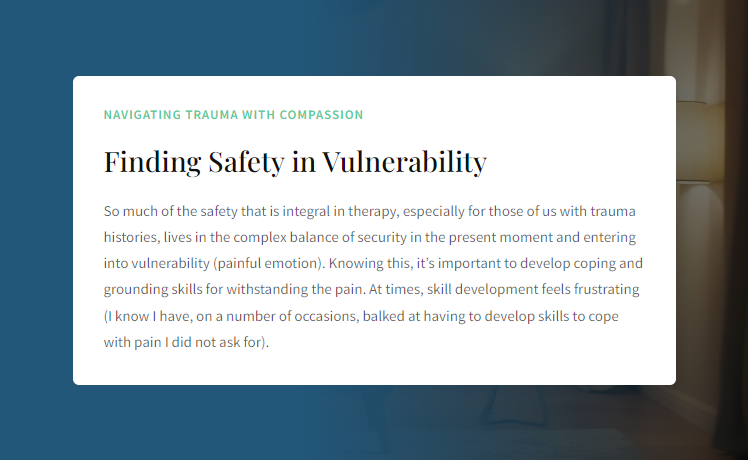
Strengthening Coping Strategies
Widening the Window of Tolerance
The more adept we become at coping with distress, the more we strengthen our ability to experience the here-and-now sense of safety in therapy as we face our pain. When your therapist helps you ground, develop coping skills, notice the present moment, etc., they are helping you widen what we call the ‘Window of Tolerance.’ Maximum therapeutic benefit in an appointment with your counselor (or in coping outside session) happens when you are able to maintain awareness of the both/and of pain and safety.
Practical Applications
Everyday Examples of Staying Within the Window
Remaining inside your window of tolerance doesn’t mean you don’t experience emotions. It means we minimize the distress that occurs when a painful emotion is present. Essentially, existing within that window means you can experience sadness, fear, or anger without triggering a survival (fight/flight/freeze) response. If you have ever become frustrated with a distracted driver while maintaining your ability to focus on the road, become upset with a partner and took space away to process emotions before resolving conflict, or made a mistake on a project and were able to reframe negative thoughts about yourself – You have remained within your window.
Reflections on Progress
Becoming a Harbor of Safety
Progress in therapy does not mean something isn’t sad or scary over time. It means you become your own harbor of safety and remain compassionate and present with yourself as you heal. Safety is not always necessarily the absence of danger; safety is your ability to connect with yourself, your support system, or your coping skills when danger is present.
The Balance of Safety and Vulnerability in Therapy
In therapy, especially for those with trauma histories, safety is a delicate balance between feeling secure in the present moment and being open to vulnerability. This balance is crucial for healing and growth.
Expanding the Window of Tolerance
When your therapist helps you ground yourself, develop coping skills, and stay present, they are helping you expand your Window of Tolerance. This allows you to experience emotions without triggering a survival response, enabling you to process and heal more effectively.
Developing Coping and Grounding Skills
Developing coping and grounding skills is essential for managing painful emotions. Although it can be frustrating to build these skills, they are vital for maintaining a sense of safety and stability during therapy.
5 Steps to Coping with Panic Attacks
Unless you are face-to-face with a bear or another physical danger, nothing feels more terrifying than a panic attack. Many have gone to the Emergency Room fearing heart attacks, strokes, and death. With symptoms including chest tightening, throat constricting, and...
Depression & Obsession: Social Media Disclaimers
At no other time in history have we been able to connect so well with long-distance loved-ones, receive instant feedback on an idea, belly laugh at goofy memes, or find welcome distraction in someone else’s story. In many ways, social media has been a tremendous gift...

